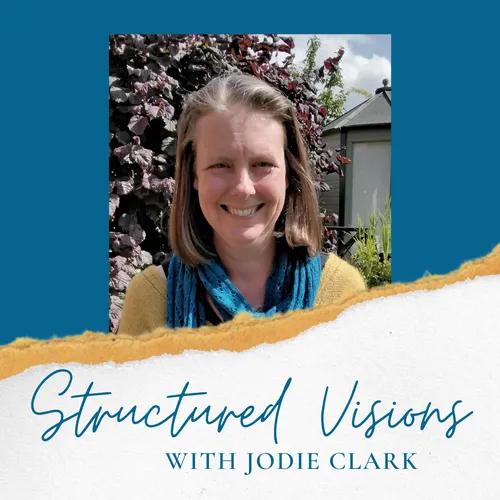
Structured Visions
Linguist Jodie Clark explores creative ways of imagining social transformation.
- Update frequency
- every 20 days
- Average duration
- 39 minutes
- Episodes
- 115
- Years Active
- 2015 - 2025

Episode 55 Critical condition
This week I discuss the branch of linguistics – Critical Discourse Analysis, or CDA – that most informs my approach to grammatically analysing texts. It’s the ‘critical’ part of CDA that appeals to m…

Episode 54 I was so hungry
Our explorations in phenomenology have led us to understand consciousness as submerged in the world of perception. I have made a case for understanding this phenomenological world not as material wo…

Episode 53 Submerged in the social world
Remember Episode 51, when we made our way, blindfolded, around a room with nothing more than a cardboard tube to guide us? We delve deeper into the depths of phenomenology this week – almost literall…

Episode 52 I’m very grateful for you listening today
Today I celebrate 52 weeks of religiously produced Structured Visions episodes! Enjoy a glass of bubbly with me while I share with you some of the motivations behind making the podcast and what I fin…

Episode 51 A Message from the Emperor, part 2
We return to Kafka’s tale this week – a tale of a distance that can never be breached. What if we understood the ‘you’ in Kafka’s ‘Message from the Emperor’ – that lowly subject at the edge of the em…

Episode 50 A Message from the Emperor, part 1
We’ve been building up to some exciting ideas in these podcasts, many of which came to a head in Episode 47. Here are some of the key points:
I’ve been recommending that when we think about social st…

Episode 49 Calling all ethnographers
What do you do when your social vision doesn’t match that of those around you? Or if you come from a planet where the social world is a lot more harmonious than the one you’re noticing on earth? You …

Episode 48 The magnificent brother from the new world new world
I reached into my mailbag during today’s podcast and found this letter from a faithful listener.
OK, it was my brother.
Or, as he likes to call himself, ‘the magnificent brother from the new world’.
…
Episode 47 The grammatical face of the other
We go back to middle school this week, looking once more at the This American Life episode dedicated to the subject, and taking up once again Levinas’s notions of alterity and face. Here’s what I sai…

Episode 46 Middle school, embodied
In an episode of This American Life, 14-year-old Annie relates middle school to a ‘whitewashed, brick-walled, iron-gated prison’ that she finally escapes from. Annie’s description gives us a good exc…

Episode 45 Can’t you do something with her?
More this week on the human body and the social body. What about the self? In this episode I go against the idea that there’s a one-to-one correspondence between the self and the human body – that ea…

Episode 44 We got everything back
Today I explore in a bit more detail these two potentially provocative premises: that the social body is real, and that it hasn’t yet been formed. Let’s take them each in turn:
- The social body is re…

Episode 43 Bye bye body metaphor
There’s a new binary opposition in town! Instead of thinking, as we have been in Structured Visions, about the individual in relation to society, I’ve proposed we begin to think in terms of two types…

Episode 42 Discipline and Punish, part 3
Be prepared in this episode for a bit of dramatic irony – a term I learned when I read Shirley Jackson’s short story ‘Charles’. A little boy, Laurie, comes home every day from kindergarten with stori…

Episode 41 Discipline and Punish, part 2
We’re still on Michel Foucault’s book, Discipline and Punish: what kinds of punitive techniques are needed to keep in place different social structures? I use the Penelope Soto story to illustrate Fo…

Episode 40 Discipline and Punish, part 1
The first few pages of Michel Foucault’s book, Discipline and Punish, describe (in gory detail) a ritual execution from pre-Revolutionary France. I tend to be very squeamish about these things, so it…

Episode 39 The path of least relevance
Tumble dryers, the musical beat, computers, bodies, black holes, hairy black holes, information, desire, French laundromats, homeless soothsayers and Maya Angelou. Welcoming, adapting, embodied socia…

Episode 38 You’re outta the game!
Picture the scene: my nephew, Lane, at four years old, at Christmas, playing with his new racetrack, shouting ‘You’re outta the game!’ to anyone whose car comes off the track. Now let’s imagine that …

Episode 37 Sand in my teeth
I’m still dreaming, in this episode, of a society in which unique selves are possible. Such a dream goes beyond ideas about social inclusion. Inclusion is about fitting in to a pre-existing system – …

Episode 36 Anybody else know her?
More about how social structures close down any notion of the unique, transformative individual. When openings occur, they show up as disruptions, problems or embarrassments, as I explain in my analy…